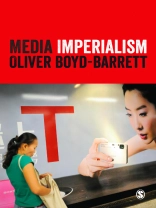How does control of media resources serve political and economic ends? What is the impact of media concentration and monopoly in the era of technology convergence, with not just traditional and ‘new’ media but also consumer electronics, telephony and computing industries?
Revisiting the classic concept of media imperialism, Oliver Boyd-Barrett presents a thorough retake for the 21st century, arguing for the need to understand media and empires and how structures of power and control continue to regulate our access to and consumption of the media. It′s no longer just Disney and Dallas – it′s also now Alibaba, Apple, Facebook, Google, Samsung and Huawei.
Examining the interplay between communications industries and the hierarchies and networks of political, corporate and plutocratic power in a globalized world, the book explains:
- the historical context of the relationship between media and imperialism;
- contestation and collaboration among new media empires;
- the passion for social justice that inspired the original theories of media and cultural imperialism, and how it has been embraced by a new generation.
Digging deeply into the global landscape and emerging media markets to explore how media power works across transnational boundaries, this book gives a clear and sophisticated argument for why media imperialism still matters.
İçerik tablosu
Redefining the Field
Territorial and “Free Trade” Empire Building: War by Media-Sanctioned Pretext
Classic Approaches to Media Imperialism: Three Models
Colonial Communication Reframed
Selling Pretexts for Imperial War
Media and the Hybrid Pretexts for War in Libya and Syria
Western Media Propaganda and Iran’s Non-Existent Nukes
Towards Digital Media Empires
Other Media Empires
Media Resisting Imperialism
Yazar hakkında
Dr. Oliver Boyd-Barrett joined Bowling Green State University′s School of Communication Studies as Director in 2005, a position he held for three years before deciding to return to faculty in the Department of Journalism. His current research interests include international and national news agencies, news media and the “war on terror, ” and Hollywood representations of the intelligence community. He was previously Professor of Communication at California State Polytechnic University in Pomona, California, and has held various appointments at universities in the United Kingdom.
Dr. Boyd-Barrett has published extensively on educational and management communications, international news media, and the political economy of mass communication. He is founding chair of the division for Global Communication and Social Change in the International Communication Association.












